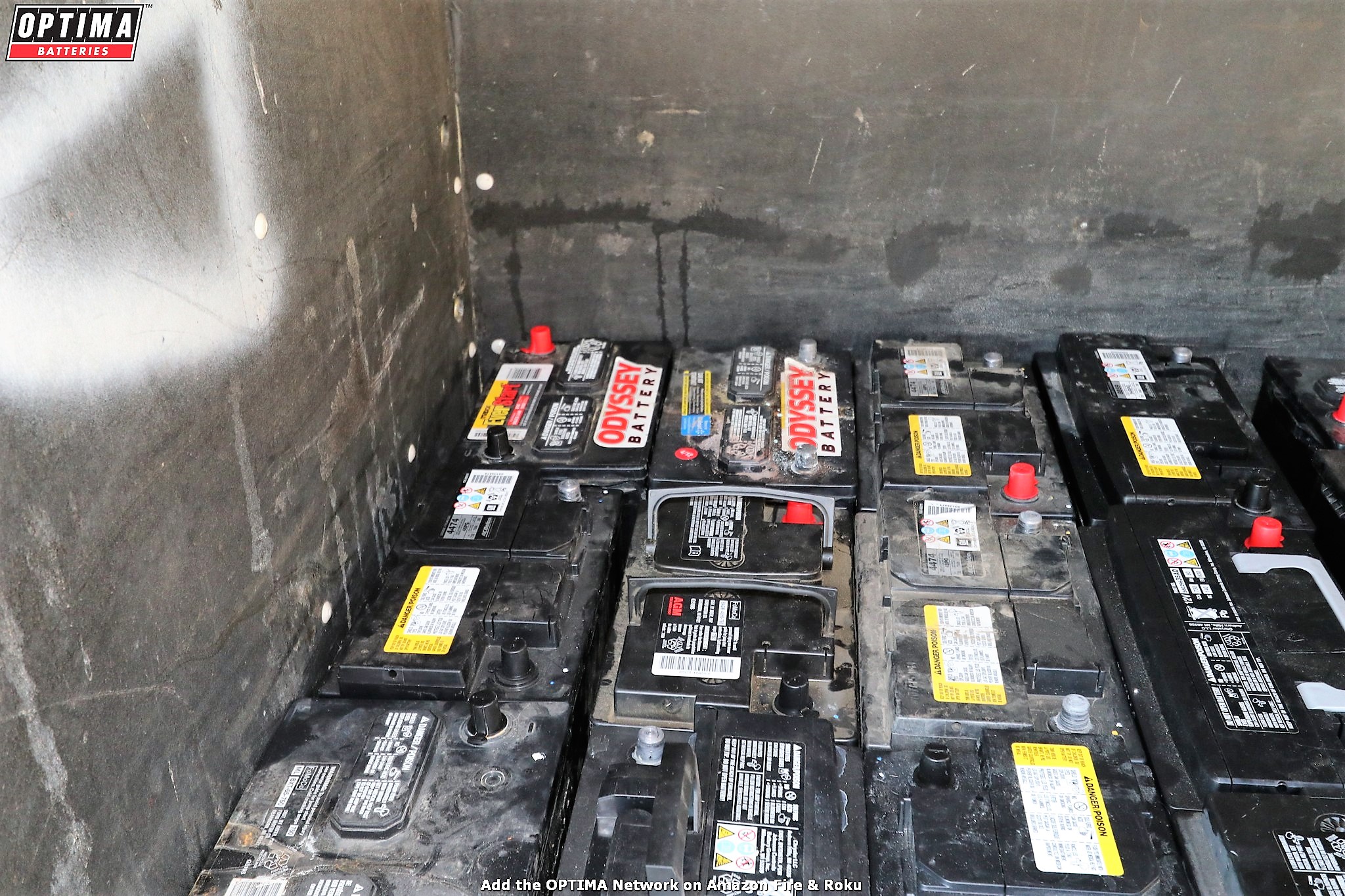How Does a Car Battery Warranty Work?

Tips & Support
- Sponsor
- OPTIMA Batteries
- Location
- Lake County, Florida


We recently received a battery back from a customer, who was requesting warranty service after they dropped their battery off the tailgate of their truck and it stopped working for them. They didn't read OPTIMA's warranty terms and conditions for their battery and didn't know damage incurred by dropping a battery off a pickup truck tailgate is not covered by our warranty. We spell that out specifically in this section:
OPTIMA Batteries, Inc. will have no obligation under this limited warranty in the event the battery is damaged or destroyed as a result of any of the following events: improper installation; damage or destruction by abusive overcharging; collision; theft; improper maintenance or mishandling of the battery; natural forces such as wind, lightning, hail, etc.; any willful or negligent act; penetration, or opening of the battery case in any manner.
While they certainly didn't intend to ruin their battery by dropping it off the back of their truck, as a manufacturer who wants to provide a valuable warranty to their customers, we have to identify what is covered under a battery warranty and what is not. The fact of the matter is, we're not alone in that regard, as most battery warranties (and warranties in general) function in the same general way.
What the OPTIMA battery warranty and most other battery warranties cover, is any defect in the actual battery itself or the workmanship that went into building it. That warranty begins on the date of the original purchase, regardless of when someone actually begins using the battery on that day and it does not re-set with any subsequent warranty replacement. Doing that would essentially create a "lifetime" warranty and while some brands have attempted that in the past, we don't know of anyone still in business today, who offers such coverage. All car batteries are consumable items with finite lifespans, whether they get used or not, so we have to identify a beginning and end to the terms of the warranty coverage.
If you look at a car tire, you can often visually see and definitely measure the depth of tread in the tires, which would indicate how much they've been used. You may also be able to visually identify cracks in the rubber from long exposure to the sun. While we put date codes on our batteries that help identify the age of a battery, it isn't as easy to determine how much a battery has been used or how much life it might have left in it.
Some commercial and industrial applications cycle OPTIMA batteries hundreds of times in a relatively-short timeframe, sometimes in just a few weeks. Even if those batteries still pass a load test, they may have reached the end of what has been pre-determined to be their useful lifespan in those specific applications and they are replaced. Most used batteries are recycled, but some are sold on the secondary market and may even look brand-new in appearance. They could continue working for several more weeks, months or years, but the warranty is non-transferrable.
In those commercial applications, the warranty coverage may be as short as 30 days or in some cases, the application itself and how the battery is used and maintained may void all warranty coverage. If that battery is then sold to someone who uses it in their personal car, that new owner may consider that a consumer application (consumer REDTOP & YELLOWTOP warranties are typically three-years in length), but any warranty coverage the battery may have had was only available to the original owner.
There are also unscrupulous individuals who acquire used batteries, clean them up and attempt to sell them as "new" to unsuspecting buyers. We see such batteries listed every day on places like eBay, Craigslist, Offerup and Facebook marketplace. No authorized OPTIMA retailers are allowed to sell OPTIMA batteries on those sites, so every OPTIMA battery sold there is considered "used" and only carries the warranty coverage that seller is willing to personally provide.
While we're mentioning authorized OPTIMA retailers, we should tell you that all authorized OPTIMA retailers handle all the warranty claims on the batteries they sell. This process can be expedited significantly if your retailer is a nationwide brick & mortar chain. If you purchased your battery from an online retailer, you may need to ship it back to the retailer for warranty service, which could take up to a week or longer.
If you're one of those people who likes to pay cash for everything, take a picture of your receipt and email it to yourself for safe-keeping. If your mom likes to buy you car parts for your birthday, ask for a gift receipt, because if you can't show proof that you purchased this battery new from an authorized retailer, you're going to have a hard time getting warranty service from anyone.
Once you provide that proof and present a battery that hasn't been dropped from a pickup truck tailgate or otherwise damaged, retailers will typically attempt to charge the battery (if it isn't fully-charged already) and then follow that up with a load test. Retailers are asked to do this, because many of the "bad" batteries returned under warranty are really just deeply-discharged and work fine, when properly-recharged. If the battery charges up and passes a load test, they will return it to you. If the retailer cannot fully-charge the battery or the battery cannot pass a load test, a free replacement battery will be provided.
OPTIMA's warranty coverage is only for free replacement and there is no pro-rated coverage offered as of this writing. If you'd like to learn more about pro-rated coverage and warranties in general, click here.
OPTIMA Batteries, Inc. will have no obligation under this limited warranty in the event the battery is damaged or destroyed as a result of any of the following events: improper installation; damage or destruction by abusive overcharging; collision; theft; improper maintenance or mishandling of the battery; natural forces such as wind, lightning, hail, etc.; any willful or negligent act; penetration, or opening of the battery case in any manner.
While they certainly didn't intend to ruin their battery by dropping it off the back of their truck, as a manufacturer who wants to provide a valuable warranty to their customers, we have to identify what is covered under a battery warranty and what is not. The fact of the matter is, we're not alone in that regard, as most battery warranties (and warranties in general) function in the same general way.
What the OPTIMA battery warranty and most other battery warranties cover, is any defect in the actual battery itself or the workmanship that went into building it. That warranty begins on the date of the original purchase, regardless of when someone actually begins using the battery on that day and it does not re-set with any subsequent warranty replacement. Doing that would essentially create a "lifetime" warranty and while some brands have attempted that in the past, we don't know of anyone still in business today, who offers such coverage. All car batteries are consumable items with finite lifespans, whether they get used or not, so we have to identify a beginning and end to the terms of the warranty coverage.
If you look at a car tire, you can often visually see and definitely measure the depth of tread in the tires, which would indicate how much they've been used. You may also be able to visually identify cracks in the rubber from long exposure to the sun. While we put date codes on our batteries that help identify the age of a battery, it isn't as easy to determine how much a battery has been used or how much life it might have left in it.
Some commercial and industrial applications cycle OPTIMA batteries hundreds of times in a relatively-short timeframe, sometimes in just a few weeks. Even if those batteries still pass a load test, they may have reached the end of what has been pre-determined to be their useful lifespan in those specific applications and they are replaced. Most used batteries are recycled, but some are sold on the secondary market and may even look brand-new in appearance. They could continue working for several more weeks, months or years, but the warranty is non-transferrable.
In those commercial applications, the warranty coverage may be as short as 30 days or in some cases, the application itself and how the battery is used and maintained may void all warranty coverage. If that battery is then sold to someone who uses it in their personal car, that new owner may consider that a consumer application (consumer REDTOP & YELLOWTOP warranties are typically three-years in length), but any warranty coverage the battery may have had was only available to the original owner.
There are also unscrupulous individuals who acquire used batteries, clean them up and attempt to sell them as "new" to unsuspecting buyers. We see such batteries listed every day on places like eBay, Craigslist, Offerup and Facebook marketplace. No authorized OPTIMA retailers are allowed to sell OPTIMA batteries on those sites, so every OPTIMA battery sold there is considered "used" and only carries the warranty coverage that seller is willing to personally provide.
While we're mentioning authorized OPTIMA retailers, we should tell you that all authorized OPTIMA retailers handle all the warranty claims on the batteries they sell. This process can be expedited significantly if your retailer is a nationwide brick & mortar chain. If you purchased your battery from an online retailer, you may need to ship it back to the retailer for warranty service, which could take up to a week or longer.
If you're one of those people who likes to pay cash for everything, take a picture of your receipt and email it to yourself for safe-keeping. If your mom likes to buy you car parts for your birthday, ask for a gift receipt, because if you can't show proof that you purchased this battery new from an authorized retailer, you're going to have a hard time getting warranty service from anyone.
Once you provide that proof and present a battery that hasn't been dropped from a pickup truck tailgate or otherwise damaged, retailers will typically attempt to charge the battery (if it isn't fully-charged already) and then follow that up with a load test. Retailers are asked to do this, because many of the "bad" batteries returned under warranty are really just deeply-discharged and work fine, when properly-recharged. If the battery charges up and passes a load test, they will return it to you. If the retailer cannot fully-charge the battery or the battery cannot pass a load test, a free replacement battery will be provided.
OPTIMA's warranty coverage is only for free replacement and there is no pro-rated coverage offered as of this writing. If you'd like to learn more about pro-rated coverage and warranties in general, click here.
